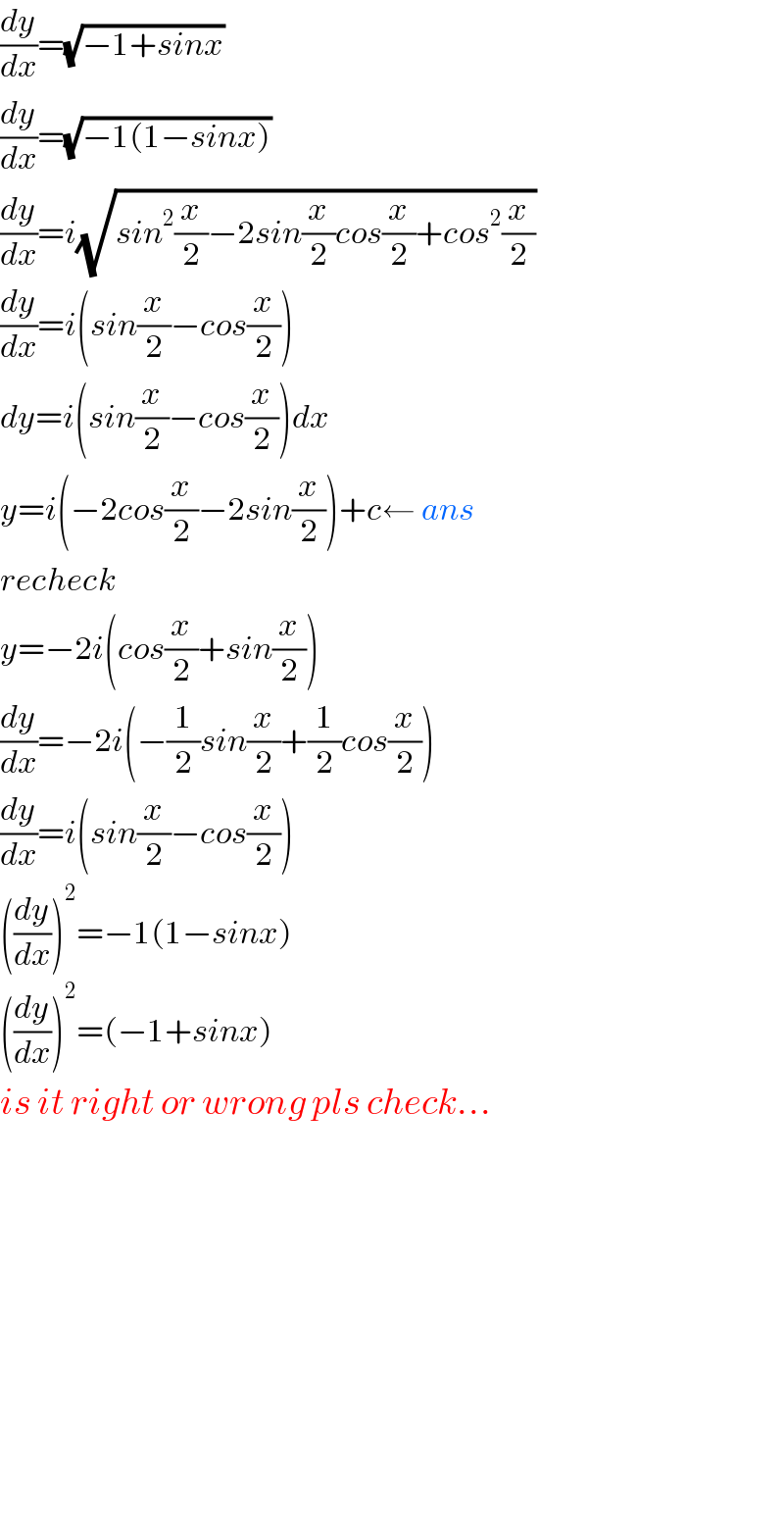Question Number 43008 by MJS last updated on 06/Sep/18

$$\left({y}'\right)^{\mathrm{2}} =−\mathrm{1}+\mathrm{sin}\:{x} \\ $$$${y}=? \\ $$
Answered by tanmay.chaudhury50@gmail.com last updated on 06/Sep/18

$$\frac{{dy}}{{dx}}=\sqrt{−\mathrm{1}+{sinx}}\: \\ $$$$\frac{{dy}}{{dx}}=\sqrt{−\mathrm{1}\left(\mathrm{1}−{sinx}\right)}\: \\ $$$$\frac{{dy}}{{dx}}={i}\sqrt{{sin}^{\mathrm{2}} \frac{{x}}{\mathrm{2}}−\mathrm{2}{sin}\frac{{x}}{\mathrm{2}}{cos}\frac{{x}}{\mathrm{2}}+{cos}^{\mathrm{2}} \frac{{x}}{\mathrm{2}}} \\ $$$$\frac{{dy}}{{dx}}={i}\left({sin}\frac{{x}}{\mathrm{2}}−{cos}\frac{{x}}{\mathrm{2}}\right)\:\: \\ $$$${dy}={i}\left({sin}\frac{{x}}{\mathrm{2}}−{cos}\frac{{x}}{\mathrm{2}}\right){dx} \\ $$$${y}={i}\left(−\mathrm{2}{cos}\frac{{x}}{\mathrm{2}}−\mathrm{2}{sin}\frac{{x}}{\mathrm{2}}\right)+{c}\leftarrow\:{ans} \\ $$$${recheck} \\ $$$${y}=−\mathrm{2}{i}\left({cos}\frac{{x}}{\mathrm{2}}+{sin}\frac{{x}}{\mathrm{2}}\right) \\ $$$$\frac{{dy}}{{dx}}=−\mathrm{2}{i}\left(−\frac{\mathrm{1}}{\mathrm{2}}{sin}\frac{{x}}{\mathrm{2}}+\frac{\mathrm{1}}{\mathrm{2}}{cos}\frac{{x}}{\mathrm{2}}\right) \\ $$$$\frac{{dy}}{{dx}}={i}\left({sin}\frac{{x}}{\mathrm{2}}−{cos}\frac{{x}}{\mathrm{2}}\right) \\ $$$$\left(\frac{{dy}}{{dx}}\right)^{\mathrm{2}} =−\mathrm{1}\left(\mathrm{1}−{sinx}\right) \\ $$$$\left(\frac{{dy}}{{dx}}\right)^{\mathrm{2}} =\left(−\mathrm{1}+{sinx}\right) \\ $$$${is}\:{it}\:{right}\:{or}\:{wrong}\:{pls}\:{check}… \\ $$$$ \\ $$$$ \\ $$$$ \\ $$$$ \\ $$$$ \\ $$$$ \\ $$$$ \\ $$$$ \\ $$
Commented by abdo.msup.com last updated on 06/Sep/18

$${its}\:{clear}\:{that}\:\:{y}\:{is}\:{a}\:{complex}\:{function} \\ $$$${you}\:{answer}\:{is}\:{correct}\:{you}\:{have}\:{verifying} \\ $$$${this}. \\ $$
Commented by tanmay.chaudhury50@gmail.com last updated on 06/Sep/18

$${thank}\:{you}\:{sir}… \\ $$
